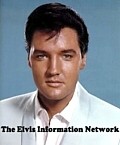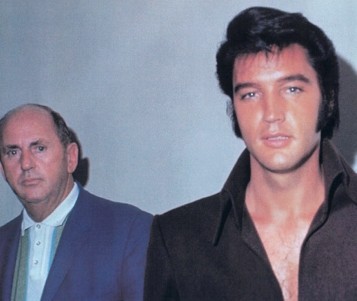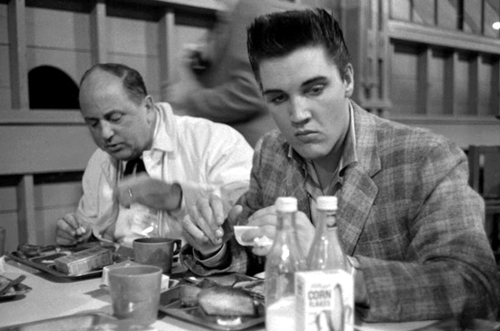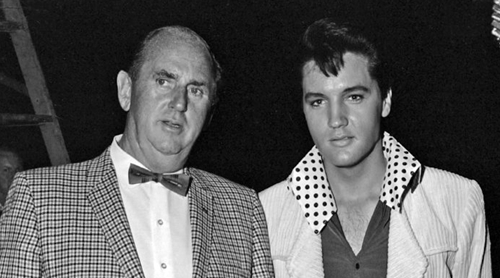June 26th 2009 is a special date that commemorates four unique events of the Elvis World.
1. The 100th birthday of Colonel Parker.
2. The 32nd Anniversary of Elvis' final concert in Indianapolis.
3. The 30th Anniversary of the death of Elvis' father, Vernon Presley.
4. The 30th Anniversary of the revelation to Elvis’ estate that Colonel Parker was still fleecing his client.
"Every entertainer should go to bed at night and pray he finds a Colonel Tom Parker under his bed when he wakes up in the morning" stated comedian Nipsy Russell when he opened for an Elvis Presley Show.
But is that really the truth?
In a recent issue of the Essential Elvis magazine The Colonel's widow, Loanna Parker is understandably very positive about her previous husband. She said,
"The Colonel never once wavered from his commitment to do the best job he could for Elvis. So much has been written in a negative light about how the Colonel did this or did that to negatively impact Elvis in some way, and I can tell you that during the entire time I saw them together from 1969 until Elvis died in 1977 I never once saw a situation where the Colonel didn't do what was in the best interest of Elvis.
There was never one time that Elvis was `forced or coerced' to do anything he didn't want to do. Every project that came along the Colonel made sure that Elvis approved of and signed off on it. You have to understand, the Colonel knew the business side and Elvis knew the creative side and they allowed each other to do their own thing. No one ever told Elvis what to do. Their relationship was very complex."
In a recent DeAgostini Elvis magazine there was another article about The Colonel which mainly praised the glory of his early management suggesting that it only went downhill in the final few years. While there is no doubt that Elvis and The Colonel's story is extremely complex, in this article EIN takes a look at the darker side of Colonel Tom Parker and includs plenty of comments from Elvis’ colleagues.
THE COLONEL
The world knew him as Colonel Tom Parker, one of the most successful managers the entertainment business has ever seen. He claimed that he was a US citizen born in Huntington, West Virginia who had been orphaned young and had a colourful carnival youth.
In reality however he was Andreas Cornelis van Kuijk from Breda in Holland, not a real Colonel and also an illegal immigrant.
While Parker did enrol in the US army he was also listed as a deserter and spent sometime in solitary confinement as a punishment. This in turn ended for him with a few months in a Mental Institution suffering from psychosis.
After his army discharge Parker began work in various carny jobs, before finally hitting the big-time with a 25% contract deal for managing up-and-coming Country star Eddy Arnold.
It was in 1948 that Parker pulled off one of his most inspired "snow-jobs" when he persuaded Jimmie Davis, former country-singer turned Governor of Louisiana, to grant him the honorary title of "Colonel". With this the fake Americanisation of Dries van Kuijk was complete.
PIONEERING EARLY MANAGEMENT
Admirers of The Colonel's style point to the legendary US TV shows in 1956 and '57 as shining examples of the perfect manager at work. It was indeed truly ground-breaking media work. Thanks to Parker's connections those tired old fifties TV formats of Perry Como, dancing dogs and corny games were changed forever by the earth-shattering performances by Elvis.
Similarly The Colonel’s business transactions that took the rock’n’roll star Elvis into mainstream cinema were also pioneering efforts of their time.
|
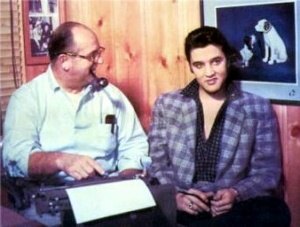 |
However when examining Elvis' astounding fifties popularity you have to consider the fact that it was ELVIS and his dynamic performances that achieved that tremendous impact on teenagers and middle-America. It was Elvis’ extraordinary talent and Greek God handsomeness which created a core group of fans whose devotion was unrivalled in pop history. The Colonel's management didn't cause that. It was caused by the public’s general need for a post-war social and musical change combined with the dynamic impact of Elvis' creativity, Elvis' talent and Elvis’ looks.
It is safe to say that it was only because of these early fifties successes that Elvis grew to trust Colonel Parker and often gave him the benefit of the doubt. There was no way for Elvis to know that after this fifties phase he had actually outgrown his manager.
(Right: Would you trust this man?)
RCA's Joan Deary: In the very beginning the Colonel was like a lightning rod, and I think that got Elvis most all the things that he got. The Colonel brought him to the attention of the whole country, the whole world as a matter of fact. I don't think Elvis could have moved that quickly by himself. The Colonel got him a movie contract; but later on, I think that Elvis could have done a great deal more creatively under different management or direction.
|
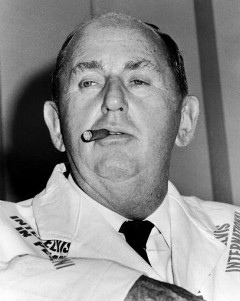 |
The continuous uninspired movies of the sixties and the continuous punishing tours of the seventies are testament to Parker's disinterest in the creative side of his artist.
It is often noted that Elvis' mother Gladys never liked Parker and that it was only his association with country-singer Hank Snow that helped swing the managerial deal which she had to agree to.
Arlene Cogan (Elvis friend): Elvis mentioned on more than one occasion when some of us were sitting around, that his mother didn't really trust Colonel Parker and didn't like him. Elvis would dread it when Colonel Parker would come to Memphis—absolutely dread it. Colonel Parker would just take over the house. He would bring in some of his men, and they would man the telephones. I mean, all the calls were screened by his people. Elvis detested this. Vernon would tell us that when Colonel Parker would come to the house and get Elvis locked up for a meeting, that he couldn't even talk to his own son until Parker left.
While it is often stated that Elvis kept over-working due to his need for cash, there is little doubt that a management strategy of one inspired album release (along with associated chart singles), one tour and perhaps one original movie per year would have been plenty to keep the money rolling in.
In fact millions of dollars were literally offered to Parker for Elvis to tour overseas. This would have not only created the challenges that Elvis needed to keep healthy and interested but would also have provided an easy source of cash.
So while Elvis himself has to be held accountable for the way his life sadly spiralled out of control to its final tragic end, there can be no doubt at all that Parker's bad management played a large part in his demise.
As a fan one has to consider that had Elvis changed management in the later part of his career there is the slim possibility that he could still be alive today.
THE HANK SNOW FACTOR
Hank Snow was an already established major country artist in 1954 with a string of hits to his credit and high standing at RCA Records and in the business. In fact when Elvis made his famous 'Grand Ole Opry' appearance early in October 1954, it was Hank Snow who introduced him to the Ryman audience. They became good friends and Snow decided then and there that his agency should get involved in booking some 'live' shows for the promising newcomer.
Colonel Parker was also Hank Snow's manager and together they joined forces to create Hank Snow Entertainments/Jamboree Attractions. And when the day came for Elvis and his parents to sign his new contract The Colonel got Hank Snow to sweet-talk Elvis' parents into believing he would make a fine new manager for their boy. As stated Gladys never really took a liking to the Colonel’s taking ways.
By early 1956 however Hank Snow's attorney became suspicious of their supposed joint business deal and Snow confronted The Colonel. When Snow questioned their partnership Parker smartly pulled out the contract that Vernon and Gladys had signed and waved it in his face shouting, "Elvis Presley is managed by Colonel Tom Parker and nobody else!"
(Right: Elvis with Hank Snow)
According to Snow, this was an alternate contract to the one they had taken to Memphis the previous August. Parker it seems had taken two different legal papers with him on that trip and succeeded in acquiring the all the signatures on the one bearing no mention of Hank Snow or Jamboree Attractions.
|
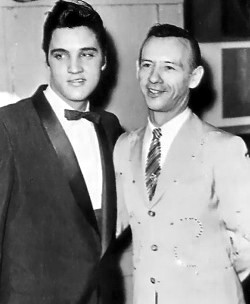 |
Hank Snow never made his share of money from his input into the discovery of Elvis. Over forty years after the event Snow still says, "I have worked with several managers over the years and have had respect for them all except one. Tom Parker (he refuses to recognise the title Colonel) was the most egotistical, obnoxious human being I've ever had dealings with."
Several other early Colonel Parker associates are similarly dismissive..
Scotty Moore: The split between us and Elvis was Parker's doing. I tried not to be around him any more than I had to. I had heard stuff about him from other people when he first appeared on the scene and I was leery of him. Frankly, he was just a con man. I could see what he did with Bob Neat He whittled away at getting rid of him. He wanted to get rid of the band. He wanted to get rid of anyone who was pre-Parker.
Gordon Stoker: He was a cold-hearted, hard-nosed business man, but that's what it took - or at least that's what he thought it took to get him through this world of bookers and such like who all wanted a piece of the action. He was an honest man and he never made a deal that he didn't stick to, even if he lost money or whatever. But he was a cold-hearted man and he never showed any love or respect for the talent that was around him. That was one thing that Elvis was missing so much. If just at one time he'd have put his arm around him or told him he was doing a good job and he was proud of him, but The Colonel just wasn't that way.
D.J. Fontana: I learned to stay out of his way. He was probably one of the shrewdest fellows I've ever seen in my life. I don't really know what their true relationship was but it worked and evidently Elvis was happy with what he was doing or otherwise he would've left and gone with someone else. I guess they had some kind of mutual agreement. I think sometimes some of the deals might have been more to The Colonel's advantage, but Elvis was happy so what can you say?
Red West: The Colonel treated all of Elvis' friends hot and cold, hot and cold. He was friendly, but he always kept his distance. I never did care for the Colonel. I'd like to know who says he's the greatest manager. It couldn't have been anybody that was around Elvis.
Right: Elvis and The Colonel in 1961. He really should have shot him! |
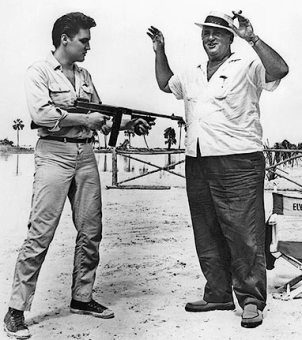 |
Where The Colonel really deserves blame is in two very basic areas.
One is that many of his later Elvis deals (50 percent split, his own Box Car enterprises, Tour extras etc) put his own monetary earnings above his client's. This is the one unforgivable sin for any manager.
Secondly he appeared to have little faith in or understanding of Elvis' true talent. This was proved over and over again in his career. It shows in the way he handled Elvis' sixties film career. It showed in the '68 TV show where he really wanted it to be a "Perry Como style Christmas show". There is a thought that The Colonel signed the 1969 Las Vegas contract on the coffee table because Parker thought the amazing performance that Elvis produced on the International stage that very first night was a fluke.
In 1973 when RCA bought out Elvis' royalties on his back catalogue, The Colonel ended up making more money from the deal than Elvis. The Colonel is known to have pocketed $6 Million from the deal, $1.5 million MORE than Elvis his client! This should never happen in a manager/client relationship.
While the pop-music and entertainment field drastically changed and matured in the mid-sixties, Colonel Parker appears to have been left behind as he still worked his old "Snowman's Deals" with people like film producer Hal Wallis and seemingly proud of his old-fashioned scams.
(Right;Hal Wallis, Elvis, The Colonel) |
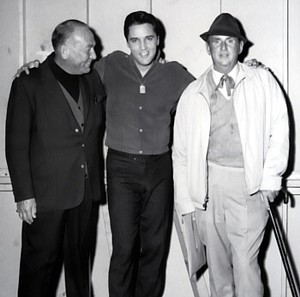 |
In regards to the record industry it is obvious to all that Parker missed the transformation where albums became the all-important creative identifier. Instead of moving to the modern release schedule of one blockbuster album per year and a couple of key chart singles, Parker kept on pumping out the same saturation schedule of the 50s. Even after the crucial Memphis sessions of 1969 and having re-established Elvis' creative importance with the '68 TV Special' Parker kept diluting these achievements with cheap budget compilations that still included dreadful old movie songs.
Who in their right mind would release an album like 'Let's Be Friends' so soon after the classic Memphis albums? The album included the new songs 'I'll Be There' and 'If I'm A Fool (For Loving You)' placed alongside turgid rubbish such as the Girls! Girls! Girls! song 'Mama' and also 'Have A Happy'?
No other artist of Elvis’ stature was left scrapping the bottom of the barrel just to fulfil their record contracts and diluting their artistic credibility in the process.
After the massive triumph of Aloha, Col Parker had negotiated a new the seven-year contract with RCA that required Elvis to supply them with two new albums and four singles per year. The new contract was dated March 1, 1973.
With no new material left in the RCA vaults RCA exec George Parkhill was forced to write to Elvis in June 1973 to remind him of his studio obligations.
In typical money-grabbing style RCA had stupidly decided to follow up the massive success of ‘Aloha’ with yet another badly thought-out album ‘Elvis (Fool)’ compiled of old leftovers and previously rejected recordings. This was hardly the way to maintain the momentum of Elvis’ new chart success, nor the way to look after their #1 client.
(Right: The June 1973 RCA letter reminding Elvis of his recording obligations - which forced him back into the studios against his own wishes)
Marty Lacker, "The songs that Col Parker and Freddy Bienstock sent Elvis to record were the usual horrible songs they had a piece of the publishing on.
So by 1973, mainly because of the crappy songs he was getting from those two, Elvis looked at recording as a drudgery." |
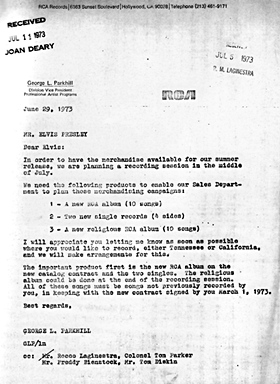 |
It is interesting to note that even Ernst Jorgenson makes a recent anti-Colonel statement on this subject in the sleeve notes of the 'Standing Room Only' FTD release....
"After the live Madison Square Garden album what could be released was an album of recordings from February and March, STANDING ROOM ONLY. This would have been musically credible by providing a current statement of Elvis and his music, as opposed to the retro aspect of the concert albums and it would have featured a true hit single in "Burning Love" to drive sales to the top of the charts.
| What did happen, however, seems by any standards to be a triumph of both artist mismanagement and commercial insanity. In October, RCA released the second volume of their budget series ELVIS SINGS HITS FROM HIS MOVIES. The new release was titled 'BURNING LOVE AND HITS FROM HIS MOVIES VOL. 2' in an effort to capitalize on the hit. Except for the b-side "It's A Matter Of Time", the remaining repertoire was old soundtrack recordings. Apart from the insult to the real Elvis fans that already had these recordings, it was also a case of serious misrepresentation of the artist. RCA boastfully announced the release of the album as establishing several "firsts". The most staggering of these "firsts" were that a record company, and an artist, would want to release a current chart single on a budget album and combine it with a stack of old and irrelevant recordings. |
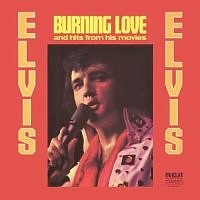 |
What's even more alarming, is that the exact same concept was used for the next single: "Separate Ways"/"Always On My Mind". This time, however, the enthralling "Hits From The Movies" tag was dropped. It is testament to Elvis' talent that he was able to survive and thrive in spite of this creative negligence that would have finished the career of any lesser artist."
Obvious managerial mistakes where The Colonel placed profit above creativity,
A) Elvis’ long term Sixties movie contracts to the exclusion of all other activities.
B) The choice of Quantity over Quality.
C) The insistence that Elvis only record songs where they had a piece of the publishing.
D) Refusing to allow Elvis to work with or even meet with his songwriters (Otis Blackwell never met Elvis, and Lieber & Stoller were excluded after Jailhouse Rock for trying to submit ideas without going through the Colonel.)
E) Not allowing Elvis to tour overseas in the Seventies.
The job of a manager should be to translate their client's aspirations into reality with the hope of exciting their audiences, along with the possibly of making a profit. If Elvis wanted to try a world tour then Parker should have made it happen. His stated excuses of security issues, venue size or such-like are not acceptable.
The Colonel also prioritised his own monetary earnings seemingly without any care as to whether this led to alienating creative people in Elvis' life. Here is another story showing how he once again managed to trick some of the key creative people in Elvis’ life out of their well-deserved earnings. The story comes from "Comeback TV Special" producer Steve Binder.
Steve Binder: Howe Bones and I tried very hard to protect our interests and control the profits of our creative work. Bones was producing records for "The Fifth Dimension" and "The Association" which earned him royalties so we thought, since we were producing the sound track to "Elvis," we didn't see why the same rules shouldn't apply. I phoned our agent, Fred Apollo, at the William Morris Agency and explained our position to him. He said he would relay the message to Colonel Parker.
No sooner had I hung up the phone when Fred Apollo phoned me right back and said I had opened up a hornet's nest and the Colonel wanted both of us fired immediately. I maintained that our demand was 100% justifiable. The Colonel was furious and phoned me personally to tell me in no uncertain terms that, "Nobody produces Elvis Presley records but Elvis himself" and hung up. It was a well-known fact, but not publicized in the business, that if you wanted Elvis to record one of your songs, you had to give over your publishing rights to his company. Bones and I stuck to our guns and didn't back off. Not long after, Fred phoned to say it was all taken care of and we could start back to work.
(Right: June 26th 1968. The Colonel's birthday party during the recording of the TV Special) |
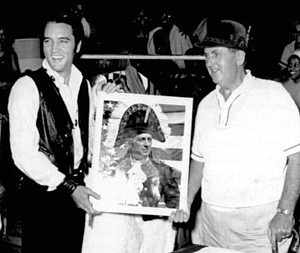 |
The solution they all came up with was that nothing in our contract would mention anything about a sound track or records. The Colonel phoned me back and personally gave me his word of honour that there would definitely be no RCA song or soundtrack album released from the television special so we had nothing to worry about. Fred phoned me to back up the Colonel's conversation. I was very naive and took the Colonel and the William Morris Agency at their word.
Here's the kicker, before the special had even started production, the Colonel made a deal with NBC to turn over the audiotapes from the special to RCA without charge. A deal that would have amounted to millions of dollars in music rights. Elvis got a free album out of the budget of the television special.
And after the special was delivered to NBC, the Colonel mailed to my home a $1,500 cheque along with an agreement for me to sign waiving all my legal rights to the soundtrack and congratulating me on the release of the album. Instead of signing the agreement, I sent the unsigned check back to the Colonel with a short note telling him where he could put it. To this day, Bones or I have never received one penny from the soundtrack earnings.
Had Steve Binder ever talked with 'Hound Dog' composers Jerry Leiber & Mike Stoller he would have known what to expect from the deceitful Colonel.
Here is their earlier story of negotiations and dealings with Col Parker, where Parker deliberately kept potentially artistic options of positive merit away from Elvis just to keep his own strangle-hold on his client.
It is certain that Colonel never made Elvis aware of these production offers to help guide his career.
Jerry Leiber: One evening in New York I was invited to a very elegant New York cocktail party at the home of Charles Feldman, the well-known agent and producer. He said, "I'm so pleased to meet you. I think the world of the work that you and your partner have done. I have just optioned a novel by Nelson Algren, A Walk On The Wild Side, and here's what I want to do. Elia Kazan has agreed to direct it and I've got Bud Schulberg to write the screenplay and James Wong Howe to do the cinematography. I want you and your partner to write the songs and Elvis Presley to play the lead." I was ecstatic. I called Mike and he was thrilled. We thought the news was going to blow the minds of Elvis and the Colonel and Jean and Julian Aberbach. We went up to the Aberbachs office at Hill & Range, and I told them the whole story, including every exciting detail.
When I was finished, Jean said, "We'll have to speak to Colonel Parker. Can you boys wait outside?" As we sat outside Jean's office we imagined how excited Parker would be. After ten minutes or so we were summoned back into Jean's office and he reported to us that The Colonel said, "If you ever dare try and interfere in the career of Elvis Presley again you will never work in New York, Hollywood, London or anywhere else in the world."
Mike Stoller: That was it. After that we stopped writing for Elvis.
Jerry Liber: Sometime later I got walking pneumonia. I collapsed in the (Greenwich) Village and went to the hospital. I was on the critical list. I was there for ten or 12 days. I finally got better and was discharged. I got home and saw 20 or more pieces of mail, a lot of them manila envelopes, as well as some telegrams. The telegrams all said, "Elvis is getting ready to record. Please come to California immediately. He doesn't want to set foot in a studio without you.
I called and asked to speak to (Colonel) Tom. He got on the phone and said (Leiber imitates Parker) "How you doin' boy?" I said, "I'm OK. I had a real close call there. I had walking pneumonia and I just got out of the hospital." He said he wanted me to pack right away and catch a plane. I told him I wasn't in any shape to catch a plane because I'd just gotten out of the hospital. He said, "If they let you out, that means you're all right." I told him I needed a day or two to get myself together, but he said the schedule was very tight and he needed me to come out right away.
Then he said, "Did you see the contract yet?" I said, contract?" He said, "I'm sure it's there by now. It's a contract covering the forthcoming movie and soundtrack album. You better take a look, sign it and send it back. So I hung up, took the contract out of one of the manila envelopes, and saw nothing but a blank page. Nothing was written on it except two lines at the bottom where Mike and I were supposed to sign our names.
I thought they had made a ridiculous blunder. I called Parker's secretary and said, "There's been a mistake", she said, "Let me get Tom." Colonel Parker got on the phone and I told him, "There's a piece of paper here with two places for signatures, but the contract is missing." He said, "There's no mistake - just sign it." Then he said, "Don't worry. We'll fill it in later."
I got off the phone with Parker and immediately called Mike. I told him, "Breaking up with the Presley outfit is like throwing away a license to print money. After all this work, I really hate to do it, but I am really offended" (When I was on the phone with Parker, I almost told him that I wasn't one of his 'okie dokies'). I told Mike I didn't want to work with this jerk anymore.
I asked Mike, "How do you feel about this?" Now Mike is a very measured and modest with very good manners. He paused for a moment, and then he said, Jer ....tell him to fuck himself!"
So I called Colonel Parker back and said, "Tom, I thought about what you told me." He said, "Good! What time are you gonna get here?" I said, "Tom, I spoke to Mike about the contract, and he told me to tell you to go fuck yourself."
I hung up, and I never spoke to him again.
(Go here to the full Jerry Leiber interview by Ken Sharp)
Others close to Elvis also add their comments about Tom Parker.
Ronnie Tutt: The Colonel was a hard guy to figure out. You could walk past him in a hallway and he might not say a word to you. You'd be looking at him trying to get eye-contact with him and he'd just completely ignore you. I could count on my hands the times he spoke to me the whole time I was working with Elvis.
Lamar Fike: The Colonel was a complicated figure. In the beginning return to the live performing in Las Vegas was unbelievable but as the Colonel always did, he ran it into the ground and it became boring to Elvis. The Colonel just never got it that Elvis needed a creative challenge. In those final years it was a case of "if only..."
(Right; The Colonel and Elvis - no eye contact!) |
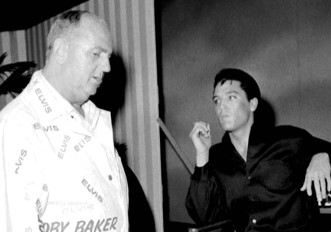 |
Jerry Scheff: I was walking in the hall backstage to my dressing room and Colonel Parker was coming in the opposite direction. It was just he and I in the hallway, and as I got closer to him I said "Hi Colonel" and he never acknowledged me or looked in my direction. He just walked straight past me down the hall like I didn't exist. I thought 'What's this all about?'. So later on I was talking to Red West and I told him what had happened. He said. "They had a meeting last night and The Colonel found out how much money you guys are making. He told Elvis, 'You could get a bunch of chimpanzees on the stage and people would still love you'."
Marty Lacker: I never liked or trusted him. My loyalty was to Elvis and Parker didn't like that especially when I was Foreman. The Colonel was good in the early years but he wouldn't change with the times. He treated Elvis like a carnival show. Elvis and some of us thought that The Colonel needed him to keep working just to feed his gambling habit. The Colonel knew about Elvis playing with drugs in the 60's and more so in the 70's - and he should have done something about it when he could.
In my opinion Parker never was concerned about Elvis' well-being and his bullshit after Elvis died was to always say "he only did what Elvis wanted him to do".
Elvis should have gotten rid of him around 1962... I blame Parker's actions for a big part of Elvis relying on pills to escape his mental troubles"
Lamar Fike: Elvis' performance schedule of 4 weeks with 2 shows per night no doubt sapped his motivation and desire to perform. No major charting superstar goes to Vegas and plays four weeks anymore, they usually only do a week. Four weeks is a marathon and the repetition of cramming 60 shows into that period can be really monotonous and mind and body sapping. The biggest disappointment for Elvis in his life was not touring outside the US.
Billy Smith: In the early days I admired colonel. He had a very strong look and piercing blue eyes. You knew he was in control. When I got older I saw that things were changing between Elvis and Colonel. He started picking on the guys, including me, for information about Elvis. Colonel always liked me and my family but my loyalty was always with Elvis. Of course I had known Colonel since I was a kid.
I know that Elvis loved Colonel, but he also had resentment toward him for holding him back on certain things that he really wanted to do. One thing was to tour Europe. He talked about it many, many times, and we all looked forward to the day that happened. Unfortunately, it never came to pass.
Larry Geller: Elvis gradually lost respect for the Colonel because he felt he was being used. He didn't feel the Colonel really cared for him as a human being. Elvis respected the Colonel for how he launched his career, but he felt it was mishandled later on.
ELVIS FIRES THE COLONEL
The long-standing tension between Elvis and The Colonel came to a head at the end of Elvis' summer Vegas season in 1973.
This was the point where Elvis should have broken free from the old carny huckster. Elvis even named Concert Wests' manager Tom Hullett to his friends as a possible replacement that he was considering.
(Right:Elvis on tour and looking tired)
Ed Bonja worked for The Colonel, taking many of Elvis’ stunning concert photos and he was present when Elvis tried to fire The Colonel after the drama of 'Closing Night' September 1973. |
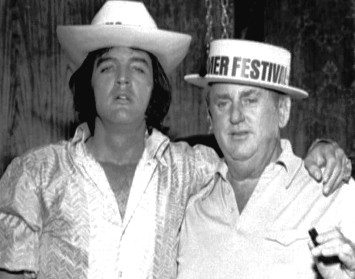 |
Ed Bonja: You know when they had that major break up in Vegas, in September 73, Elvis had told him, "Stay out of my personal life, I’m my own man". If Elvis at that point had said to The Colonel, ‘I want to take six months or a year off’, it would have been done! To emphasise that, when The Colonel once tried to talk to Elvis about the drugs and things, Elvis just went crazy. That was when The Colonel typed up the terms of the dissolvent of the contract which included Elvis paying out The Colonel a huge amount (several million dollars). Then we all went back to our offices at MGM in L.A. and we just waited.
A couple of weeks went by and I came into the office one morning and The Colonel was sitting in his office when the private line rang. This was the phone line that only Elvis or Vernon called on. I picked up the phone and Elvis said, "Hello Eddie, is The Colonel there?"
It was a very strange conversation with the Colonel just saying four or five times, "Yeah, Yeah" and then, "I’ll arrange it." After that he hung up. I immediately asked The Colonel, what did he say? And he replied, "Elvis just said, ‘He wants things to be the way they were and he wants to go out on tour again’." And that was the end of the fighting, and the break up. There had to be such psychological dependency between the two of them. They were inseparable.
Marty Lacker: I think Elvis, to a point, cared about the Colonel because of the early days but in the later years, things slowly started changing.
There were times later on when Elvis wanted to get rid of the Colonel. Seriously. But the Colonel knew Elvis pretty good and he had a plan. Because Elvis' personal business was left up to Vernon, the Colonel conned them. When Elvis was going to break up with him, the Colonel handed Vernon a bill for over two million dollars that he said Elvis owed him for expenses and shit (which was total bullshit). That scared the piss out of Vernon and he talked Elvis into changing his mind.
Elvis biographer Peter Guralnick likened Elvis and The Colonel to an unhappy married couple.
"Elvis and Colonel Parker were really like a married couple, who started out with great love, loyalty, respect which lasted for a considerable period of time, and went through a number of stages until, towards the end of Elvis's life, they should have walked away. None of the rules of the relationship were operative any longer, yet neither had the courage to walk away, for a variety of reasons."
(Right:Check the body language!) |
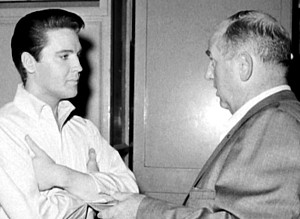 |
THE LATER YEARS
Sadly it was in the later Vegas years that Elvis' health, both mentally and physically, began a downward spiral and this is where the most serious accusations and personal vilifications against The Colonel are levelled. After all it IS the role of a professional manager to see that his artist is in a healthy, happy and fit state to undertake performances, recordings and broadcasts.
Dr Nick: It was exciting at first to travel with the entourage, but the excitement wore off in late '74 or early '75 when Elvis started losing control. It was hard to convince his management that it was better for Elvis if he toured for ten or twelve days and got rest between tours. Colonel Parker didn't take me seriously at all.
(Right; June 26th 1977 - Elvis at his final concert)
|
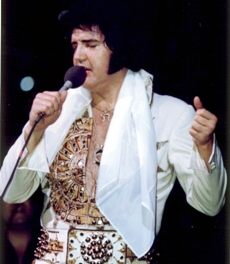 |
Dr Nick: Although he loved performing, Elvis could do just so much of it; then it produced stresses in him. A lot of his problems were the result of going through a tour of twenty to thirty days straight. In Vegas, Elvis was performing two shows a night, seven days a week, for a month at a time.
Elvis had respect for Colonel Parker and for what he'd done for him in the past; but they had some problems getting together and talking about things. Towards the end Elvis would avoid conversations with him.
The following story from Larry Geller is very upsetting and certainly not unbelievable.
Larry Geller: On one of Elvis' last 1977 tours we were in Louisville, Kentucky, and Elvis was physically ill and was going through so much emotionally. This one night in particular he was nauseous & feverish and he felt terrible. The next day when I got back to Elvis' suite I walk in and surprisingly Colonel Parker is there.
The first time I ever saw him come to Elvis' room. I say, "Hi Colonel." He says, "Where is he?" I explain that he's with Dr Nick and I say, "Let me tell Elvis you're here." The Col brushes past me saying, "No. I'm going right in" and he opens the door. It pains me to even tell you this but what I saw was Dr Nick kneeling at Elvis' bed. Elvis is comatose and groaning and Dr Nick is dunking Elvis' head into a bucket of iced-water to revive him. It was a pathetic sight. The door closes and my first thought was, 'This is probably good since finally Col Parker is going to find out what the hell is going on.
The Old Man is going to see Elvis in this terrible shape, semi-conscious, and stop this awful tour'. A minute later the door opens, Col Parker walks up to me, and I stand up. We stand toe to toe and he looks me in the eyes. He says, "Now you listen to me. The only thing that is important is that that man is on stage tonight! Do you hear me? Nothing else matters." Then he walks out. My heart sank. I knew the truth and I wanted to scream. Oh my god, that shallow Motherf****r.
I then heard Elvis shout, "Lawrence are you there? Why the hell did you let that bastard in here?" I explained that he had walked right past me and then Elvis ranted for an hour about Col Parker. He just used every word in the book and said, "That's big, fat, *** …. I'm going to get rid of his fat ass. Daddy wants to get rid of him; he's hated him for years. I can't stand him. He's lost touch with show business years ago. He's just using me and I want Tom Hullett to be my manager. After the tour in September that is it!" He talked about who he was going to fire and how he was going to change things for the good. It never happened.
More positive is Sonny West who defends The Colonel against the harsher stories.
Sonny West: The Colonel is the most maligned person in the Elvis Presley World. He cared about Elvis, he used a brusque manner at times when a situation seem to warrant it. He wasn’t right all the time, no one is, but he was most of the time. He deserves a much better hand than he has been dealt. In my book, I correct a lot of misconceptions about Colonel, most of which were made by people that simply did not know the truth of the matter, even some members of the inner circle of Elvis’, or others that seem to have an axe to grind.
(Right:In happier times) |
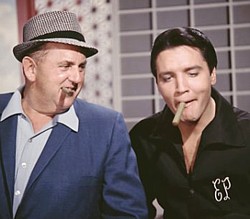 |
However when you basically compare The Colonel to other major managers (for instance Motown's Berry Gordy who also ripped off his artists) he seems especially lacking. Gordy for instance actually did groom his artists for stardom, cultivated song-writing and production contacts, wrote and played music and was just a good a promoter. Parker in the end seemed to be there only for the money.
It is notable that after Elvis' father’s death on June 26th 1979 Lisa Marie's representatives filed allegations in court against The Colonel. Vernon had kept the extent of Parker’s commission after Elvis’ death very secret.
So it was only after Vernon’s death that it was finally revealed to the co-executors of Elvis’ estate that The Colonel was still taking over 50% of the income generated by Elvis’ legacy even though he had no artist to manage!
The charges against Colonel Parker were that he enriched himself by mismanaging Presley's career and cutting the singer out of millions of dollars by negotiating unfavourable agreements as well as taking advantage of Elvis when he was in poor health.
(Right: Parker & a very frail Vernon in 1978) |
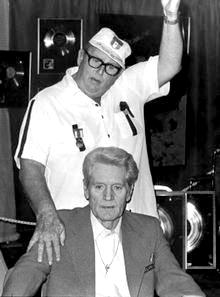 |
Attorney Blanchard Tual was appointed by Judge Joseph Evans to fully investigate the case and he spent four months looking into Parker’s financial dealings.
Tual speculated that Col Parker had sold Elvis cheaply to the Hilton to help pay off his gambling debts which were often said to be in the millions. It was also noted that by the 1970s Elvis’ RCA royalty rate was far below any other performer at his sales level. Even Elvis' royalties were underpaid because Elvis' contract had no audit provision. This is industry standard. In fact the lack of an audit provision was probably Parker's most negligent act.
It's a sad fact that Tual finally concluded that both Colonel Parker (and RCA) acted in collusion against Presley's best interests. Colonel Parker was guilty of self-dealing and overreaching and had violated his duty to both Elvis and to the estate. "These actions against the most popular American folk hero of this century are outrageous and call out for a full accounting from those responsible."
In 1983 Parker eventually agreed to sell his master copies of some of Elvis' major recordings to RCA for $2 million and to pass on most of his Elvis assets to EPE and to drop any claims he had to Presley's estate.
Back in 1968 when The Colonel was asked if he took fifty percent of everything Elvis earnt, Parker replied, "No! That’s not true at all. Elvis takes fifty percent of everything I earn."
Even in 1993 the wily Colonel was still maintaining his bluff noting, "I don't think I exploited Elvis as much as he's being exploited today."
Critic Dave Marsh delivered one of the most damning assessments of Colonel Parker when he said, "Parker was the most overrated person in the history of show-business. The Colonel went to his grave believing he had pulled off some carny trick, when what he had actually done was sell genius short for 23 years."
Of course there is no denying that The Colonel achieved some amazing milestones that showcased Elvis' unbelievable talents especially in Elvis' early career. So Parker was perhaps not the complete devil as some believe. However looking back at Parker's management one gets the feeling that his reputation in the media still ends up being too over-inflated for what he was.
Maybe comedian Nipsey Russell wasn't aware of what was really going on or never talked to Elvis’ colleagues. Does every performer really need a Tom Parker under their bed? Possibly not!
Spotlight written & researched by Piers Beagley
-Copyright EIN, June 26th 2009
HAVE YOUR SAY - Click here to send EIN your feelings about Colonel Parker.
Colonel Tom Parker, his collection in Madison: Like him or not, Colonel Tom Parker kept very well organized files on everything Elvis. Back in 1983 Parker was forced to sell his assets to EPE and to drop any claims he had to Elvis' estate after Lisa Marie's representatives filed allegations in court against The Colonel for mismanagement. It is quite unbelievable how Parker kept so much stuff during Elvis' life and which finally helped him make that special deal with EPE.
CLICK HERE to see in this rare video Parkers store of movie reels, promos, documents etc. Why Graceland keep fans from seeing so much of this unreleased material is beyond belief. Enjoy this amazing video and hear for yourself how hard Tom Parker worked for Elvis as a manager!.
Critic Dave Marsh delivered one of the most damning assessments of Colonel Parker when he said, "Parker was the most overrated person in the history of show-business. The Colonel went to his grave believing he had pulled off some carny trick, when what he had actually done was sell genius short for 23 years."
|
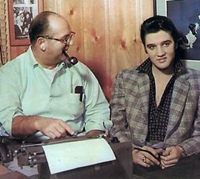 |
Colonel Parker's Elvis hoard - Marty Lacker comments:
>> Reading your story above and watching the short video pertaining to all the things Parker had in his Madison office squirreled away unbeknownst to Elvis, made me even detest the carny con man even more. In my opinion, all of those things pertaining to Elvis should have been in Elvis' possession at Graceland or at least a copy of them for his enjoyment and memories. Those are things that Elvis generated not Parker and truth be told, Parker probably charged those things to Elvis as expenses through the years Elvis was alive. EPE should never have had to pay for them after Elvis died and the courts got rid of Parker. Lisa Marie really owes Blanchard Tual, the Memphis court appointed attorney who became her Guardian Ad Litem for uncovering all of Parker's terrible actions in all those years with his side deals and other actions.
I wholeheartedly agree with Dave Marsh and could add much more to it. More and more I think things should be exposed that this con man got away with. - Marty Lacker
|
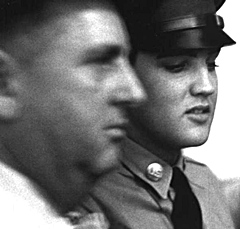 |
This Spotlight was not possible without the major contribution from Harley Payette, as well as input from "JBNVA58" at the FECC forum.
Click here to comment on this article
References:
EIN exclusive Interviews
Elvis: The Man & His Music
Essential Elvis UK
Careless Love - Peter Guralnick
The Colonel - Alanna Nash
Elvis Up Close - Rose Clayton & Dick Heard
‘68 @ 40’ Retrospective – Steve Binder
EIN READER'S FEEDBACK
From: Claudia K.
Tom Parker had a great ability to observe and read people. He was also an awesome promoter.
But that's about it for positives in my opinion.
My gutt is having hickups whenever I look at his image, and most of what I read about him matches this.
The man who made chickens dance on a hot platter and stole money that people donated to a dog shelter lacked severely in the empathy department of human nature. This never changed.
Somebody who is not just comfortable with, but enforces a fake title tells a lot about himself by doing so.
He used his abilities to get what he wanted. That does not mean he put them to good use.
Since he could always count on the other half of the team to live up to the expectations all he had to do was do his job to ensure his huge income. And yet, he could have done so much more had he been a true manager at heart.
But until the day he died the world (with or without Elvis) was no more to him than one big circus.
From: Mike Croce
Colonel Parker was the world's worst manager. He looked out for his own interests and didn't seem to care about Elvis as an artist or a person. Elvis' two biggest triumphs of his post-Army career, the 68 comeback Special and the 69 Memphis Sessions with Chips Moman were successful in spite of the Colonel's interference. Parker took too big of a percentage, he limited Elvis' access to songs by insisting on a cut of songwriters' publishing (so good writers would not submit songs to Elvis) and he set up grueling concert tours in the 70's which made it difficult for Elvis to be enthusiastic about live performances.
He screwed Hank Snow on the first management deal, drove Scotty and Bill away and then cut out Elvis' great songwriting team of Leiber-Stoller. He ruined Elvis' movie career, and he hurt Elvis' integrity as an artist by repackaging some of the movie songs into numerous budget albums.
He turned down potentially lucrative overseas concerts, which hurt Elvis professionally and disappointed him personally. He turned down a chance for another career comeback in A Star Is Born with Streisand. It is a tribute to Elvis that he was so popular despite having a manager who was working against his best interests. Colonel Parker controlled Elvis' entire career and when it went into decline in the 70's, Elvis got bored/depressed/ bitter etc. and got hooked on drugs. While Parker didn't literally force his client to take drugs, his total control over Elvis' career and at least partial control over his personal life makes him at the very least a co-conspirator in the destruction of Elvis.
From: Charles Stanchik
Colonel Parker was the Bernard Madoff of his time. (The disgraced US financier who publicly admitted to running a massive, decades-long Ponzi scheme that cheated investors out of billions of dollars). Parker wasted Elvis' talent for the almighty dollar. he took advantage of him during 1974-77 and upped his take. The only people in the memphis mafia that praise the Colonel are those that let Elvis down as well.
If Parker hadn't died he would make a perfect cell mate for Bernard Madoff.
From: Sidsel Ferguson
My feelings about ”Colonel” T. Parker are so mixed, and so are my feelings about other members of Elvis ”clan” I think there were many who took advantaged of Elvis, cheated on him, and used his kindness.
Let`s say "The Truth, The Whole Truth, and nothing, but The Truth”. I believe that the ”Colonel” should not have been Elvis`manager. He deserved a more honest person. All he was after was Elvis`money. He forced Elvis to go on stage, even he was very ill! That is so bad, so cruel.
There are many, even to day, who cheat on Elvis, using his name to become famous, for ex his step son, and his former wife, who calls herself a widow after Elvis: Hardly. She can`t be a widow, since they had been divorced for 4-5 years. It is cheating. She blamed Elvis for everything, her facelifts etc etc. It was Elvis who build her up!!
I really hope someone soon takes back on ALL those who cheated on Elvis, and still do.
From: The Wench
Although I'm not a rabid Elvis fan, I have to admit that many of the circumstances of his life are intriguing. I remain in two minds about him, mostly because as an African American, I feel that he was allowed to take a genre of Black music and capitalize on it to the fullest without supporting other Black artists, or using his increasing influence to help to heal the terrible segregation which existed in states like Tennessee. This may not seem like anything to do with "The Colonel," (who is probably every bit as fascinating to some as Elvis himself was), but I think it does, because it was Parker who counseled EP in 1954 not to acknowledge his support for "race artists," nor to admit publicly his great admiration for the music of "niggers." As an AA in 2010, this strikes me (as I'm sure it does many people), because for one thing, it points up what so many Blacks continue to believe about America. That a White illegal alien, which Parker was, (and who also never bothered to take out citizenship in the country that eventually made him a multimillionaire), could literally step fresh "off the boat" in 1929 into the country that Blacks had been building for generations, show no respect for Black music (his favorite song was O Sole Mio!), refer to Blacks as "niggers" and get rich off of his client singing the Blues and R&B. As a White person, Parker was also able to buy the title of "Colonel," which other White men were willing to sell to him. He and Elvis benefitted from a system that continues to have important and powerful White men willing to do business with the Tom Parkers of this world, while ignoring others who are perhaps more deserving. Ironically, to continue with the race theme, in signing up with Parker, Elvis in a way became his "slave."
Perhaps it is a strange sense of justice that Elvis did not get the film career he wanted -- to emulate Tony Curtis, James Dean and Brando -- men he idolized. (Parker himself stated on video that it was Elvis who told him that he did not want to do "A Star Is Born," and that he was to make Streisand and Peters an offer they would have to refuse!) Perhaps it is just that he did not get the chance to "take" the styles of Curtis, Dean and Brando, among others, for his own, as he did Black music. Perhaps it is just too, that he didn't get to make the coveted martial arts film later on, thereby "taking" that form from the Asian community and possibly profiting from it.
Just as unfortunately, Elvis Presley was a man willing to allow the single most important woman in his life to die, rather than listen to her pleas against Parker. If there was one person who could have buffered Elvis against this former carnival operator, who had had years of perfecting his "persuasive" (and possibly hypnosis) tactics on others before unleashing them on Elvis, that person would have been Gladys, who didn't want the riches and luxury that Elvis wanted for her. She only wanted her chickens, as well as her son staying closer to home. Sadly, Elvis chose "The Colonel" over her. His famous Southern loyalty apparently extended away from her, and he would spend the rest of his life feeling tremendous guilt and grief over his loss of her. Perhaps then, it is just that he never fathered the son he reportedly so wanted.
As for Elvis asking repeatedly "why me?" Well, Elvis agreed to go along with whatever it was that was sweeping him along. He chose to sign agreements, go on tours, make public appearances, and not stand up to Parker at the times he really should have -- even allowing Parker to decide who he should marry. He wasn't a hapless victim, but in a relationship as Faustian as his was with Parker, I do believe he "shook hands with the devil," for which in the end, Elvis himself would pay the ultimate price.
- Signed: The Wench
From: Charles Stone (Elvis tour manager who worked with Col Parker)
Having worked with Colonel and right by his side for a number of years I can personally attest to the fact that he loved Elvis and kept Elvis on top at all times. He had numerous opportunities to handle other clients but remained loyal to Elvis. There will always be opinions of he should have done this or that but at the end of the day he did what was best business wise for his only client. we can all sit back and dissect his decisions but none of the bad decisions made a castropic difference in Elvis career. He was and always will be regarded as the most talented manager in the business. I think without Colonel there would not have been an Elvis and for that we are grateful to him. What ever personal relationship he had with Elvis will forever remain just that as it was only between Colonel and Elvis and no one else.
Colonel and Elvis were a team and at any given time Elvis could have fired Colonel and changed managers. He did not which says something for his career choices. we can all sit back and dissect what Colonel did or did not do but in the end he kept Elvis the star that he was. I personally don't think any other person could have handled Elvis. I had the privilege of working closely with Colonel and I can tell you that he loved Elvis and made the best decisions possible at the time. above all Colonel was an honest man and his word was better than any contract. there is not and never will be another artist manager who has the recognition Colonel had. Elvis and the Colonel is a phrase known around the world. Their relationship was private and will always remain that way, all we can do is speculate what may or may not have been said.
From; Brian TCB
I think the Colonel made 3 mistakes in his management of Elvis
1. If you look at Elvis movie career it wasn't the early 60's movies that damaged his reputation as an actor nor was it the late 60's movies it was the films being made in the mid 60's like Harem Scarem, Girl Happy, Paradise Hawaiian Style, Spinout, Double Trouble, Easy Come Easy Go, Clambake and Speedway
These 9 films damaged Elvis credibility as an actor and as a serious musical artist very badly. I think Parker should've at least pushed the studio's harder for better roles i'm not saying great dramatic acting roles just some decent one's, what Elvis needed in the mid 60's was another Flaming Star, Wild in the Country, Follow that Dream, Kid Galahad or maybe even a Trouble with Girls or Change of Habit type script or role that would've been a hell of a lot better than the movies Elvis clunked out between 1965-1968.
If Elvis had made some decent films in the mid 60's his reputation would have been a lot better off.
2. I think the decision to stop recording and putting out studio albums after 1962 in favor of movie soundtracks was a big mistake.
I like all of Elvis studio albums from the 60's and think they are all very good to think Elvis didn't put out any between 1963-1967 is mind boggling we probably missed out on some good music.
I could just imagine Elvis experimenting with new songs by new writers and new sounds.
Elvis didn't record any compositions by Mitch Murray, Goffin and King, Mann and Weil, Jeff Barry and Ellie Greenwich, Burt Bacharach and Hal David or Tommy Boyce and Bobby Hart these writers could've kept him in the game commercially and creatively during his lean period 1964-1968.
3. Not performing overseas: every major recording artist has at least done this to some extent except Elvis.
This seems to be the biggest thing held against Parker not setting up a European or a World Tour for his client.
Let me say I think Elvis career was doing very well from 1968-1973
After the TV special you had the shattering of the Vegas attendance records in 1969 and 1970 then you had a sold out U.S. tour, top 10 records in 1969 and 70, The Jaycees award in 1970, The Grammy lifetime achievement award in 1971, EOT winning a Golden Globe for best documentary in 72, He Touched Me album winning a Grammy in 1972, The attendance records he broke all across the U.S., The Aloha Special in early 1973 hit album and huge ratings success. The only thing he needed in this time was a European Tour after the completion of the 1970 U.S. Tour Elvis should've toured Canada in early 71 then in the summer of that year he should've done a tour of the U.K. plus a couple of additional countries like Germany and France to keep his career momentum going.
One of the Colonel's best ideas was the worldwide satellite concert Aloha after that was over to again keep Elvis’ career momentum going he should've set up plans for Elvis to go on a huge ambitious World tour that would include going to every country that saw Aloha plus England. Now if Parker had done this it would've kept Elvis challenged and happy at least for a while and he wouldn't be vilified for never setting up international dates for Elvis.
This would've never have been an issue among the fans and Elvis dream for performing all over the world would've been satisfied.
Colonel Tom Parker is widely regarded as being a great manager in the early years for Elvis but in the middle and in the latter years of his career is thought to be a bad one had he done these 3 things he would've been held in much higher regard as a manager in the latter career of Elvis Presley.
I think what everybody's saying is Elvis should've took on more interest in learning about the business and being more involved in it instead of relying on the Colonel and his advice so much. He should've made more of his own decisions after all it was his career.
Elvis actually stood up to the Colonel or went against what he wanted many times in his career far more than he is given credit for so it wasn't a case of him not being able to stand up to the Colonel it's just that he should've done it a little bit more often on certain things.
From: Ken
Parker was a paid consultant to RCA, and he negotiated contracts for Elvis with RCA (RCA got the best of the deals) there has to be a conflict of interest.
There was also some conflict of interest with the Hilton contracts which the judge investigated, and most definitely the deal with Vernon to continue as before was not fair to the estate.
Elvis and Vernon were just not business men-Parker was and he used his "Snowman" abilities to make deals seem fair I'm sure.
I do think it is fair to hold Parker responsible - for deals which were not in Elvis's best interest because his job was to look out for Elvis's best interest in negotiations. Elvis surely began to figure it out in the mid 70s - but was simply to insecure on such matters to really make the break. Parker made sure Elvis was dependent on him by playing on his insecurities.
In a letter Parker sent Elvis in the early 70s warning him of listening to others concerning new songs or music, and about them trying to get into his good graces and playing up to him - which Parker in the letter was doing for himself. In between the lines of the message was -"You can't trust others, but you can always trust me". Parker was smart at reading people and IMO he read Elvis like a book.
On the music side one can argue that Elvis towards the end was apathetic and the blame for apathy must lie at his door.
However on the business side I do not fault Elvis for not understanding all the things the Colonel handled - because he trusted that Parker was handling them honestly for Elvis's benefit and that his interests were protected not just in dealing with others-but with Parker himself. I guess it is the matter of trust that irks me most.
From; Mike at TCB.
I truly believe that in the beginning The Colonel and Elvis made a very powerful pair in the entertainment business! Who else could have brokered the kinds of deals that The Colonel did for Elvis, such as the Sullivan show deals (in terms of the amount of money he was able to secure for Elvis' appearances), the movie contracts, etc. And I think The Colonel did a masterful job of keeping Elvis' name and music in the public eye while he was in the Army. I mean, let's face it....with another manager, Elvis could have very well slipped out of the public eye while he was away in the Army. But The Colonel was savvy in releasing just the right single or album at just the right time, or put out just the right press release when it was needed to keep Elvis' name constantly in the headlines!!!
And of course, the first couple of years following Elvis' release were basically a continuation of the powerhouse coupling of Elvis & The Colonel with the movie deals, the Frank Sinatra show, the Hawaii Benefit, etc.
HOWEVER...by the time Elvis was locked into the endless stream of movie contracts and silly soundtrack recordings in the mid-to-late 60's, it was clear to everyone (but Elvis, I suspect) that perhaps The Colonel had outgrown his ability to present Elvis the kind of challenges and changes that Elvis needed as an artist, an actor, a musician and as a human being. Yes, there were moments where The Colonel could still pull off a sweetheart of a deal, like the '69 Vegas engagement, but those moments were becoming fewer and farther between.
But sadly, because of Elvis' insecurities in regards to his career and his huge sense of loyalty to The Colonel for all that he did accomplish to get Elvis to where he was, Elvis wasn't about to fire The Colonel. And unfortunately, THAT is the truly sad part of the Elvis Presley story. Elvis simply couldn't say to The Colonel "Thank you for all you've done, but it's time for me to move in a new direction." Why didn't Elvis do that? There are many speculations and rumors, but for whatever reason, it just didn't happen and by the mid 60's or the early 70's, it CLEARLY needed to be done.
Would it have changed the course of history for Elvis? Maybe... maybe not, but sadly we'll never know what could have been and we're left with what TRAGICALLY happened.
So, basically, while I think Elvis and The Colonel were a formidable duo in the beginning, in the later years, it became increasingly clear that The Colonel's focus was solely on how much money Elvis could make for The Colonel....and all of the clearly one-sided deals that The Colonel made on Elvis' behalf to increase The Colonel's wealth, while making Elvis work harder and harder, is truly a sad tale... and one that really makes me ANGRY every time I think about it.
From: Tom Cercone
What a sad commentary about a man who supposedly was a great manager. It appears that parker was a master rip-off artist. True, elvis could have broken away but was naïve about the business of show business as was his father. Seems to me that most of the comments concerning parker are negative concerning elvis' health and welfare. Also , it seems that parker's time had passed him by. I can only imagine what creative genius could have been explored had elvis been exposed to modern management. The more that I read about parker the more that I feel short - changed as a lifelong elvis fan. My heart goes out to this extremely talented and loved man.
Thanks for the great article!
From: Neil Schmidt
I have no respect whatsoever for Parker. Yes, he did guide Elvis to national and international prominence but he then committed the greatest sin ever in the history of music by short-changing the world of a great musical talent. If anyone has any notion to defend that man, then they should only reflect on what the Attorney Blanchard Tual found in 1983. Parker was nothing more than a 2 bit carny huckster who cared not one iota for Elvis, as a human being or as an artist. It is also a personal theory of mine that he had something to do in getting rid of the only other person in the world who could influence Elvis apart from himself... Gladys Presley. I don’t expect too many people to agree with me on that theory, but . .
From: Ida Ritter
I came to my own conclusions and firmly believe that Col. Parker was such a manipulative and controlative individual and that his narrow way of thinking had a lot to do with Elvis not being able to develop his talent any further and cut him short of developing his great potential as an actor. He only care about the lucrative part of Elvis Carrier, and demanding to have a "piece of the publishing on the songs that Elvis recorded" deprived him of recording much better material.
The seclusion that Elvis assumed in his home at Graceland away from the real world with only the MM around him which I thought at times was exaggerated, his frustration,the lack of any challenge, his loneliness, as an intelligent and talented man that he was he knew what he had made of his own life and Carrier, that was in part the cause of his addictions and until the end we could see the lack of compassion and care that the Col. had towards him, he ruined Elvis's carrier and potential, I believed he became famous because of Elvis and even though he was a key in Elvis's fame, was also a negative one, his dark side enclosed Elvis in a capsule that he created for him, deprived Elvis of singing with his friend Sammy Davis Jr., record a song with Dolly Parton because of his publishing demands, and so many others, even his behavior at Elvis's funeral. I still get so sad when I read about all this and think how much Elvis could have done with himself and his carreer if he would have had a different manager and the evil that Col. Parker was.
From: Carolyn M
From everything I have read about tom parker, I can say that I have never found one redeeming feature about the man.
Having said that, we also need to acknowledge that Elvis himself was a very loyal person and he also demanded loyalty from those who worked for him. He also trusted his father explicitly and in my opinion, Vernon was almost as responsible for Elvis' workload as tom parker was. If you remember, Gladys was not in favour of Elvis signing with parker, but it seems as though she was talked around by Vernon and the fast talking old carny himself. Vernon could see this was a way out for them as regards their financial stability and really all Elvis wanted to do was a) take care of his parents, and b) sing.....
I'm sure Elvis at a few stages in his career wanted to try some other kind of management, but we know for sure at least once when he did try this, parker came back with the most outrageous demands that Elvis and I'm sure his father, couldn't see any way out of it. I think Elvis was totally unsure of himself as far as his talent went...I know it probably sounds unusual, but he was forever asking "why him?" Parker it seems did have some kind of hold over Elvis and his father...was it because he knew about Vernon’s time in prison? This at the time was a bit of a disgrace, and I have no doubt in my mind that Parker would have used this if he could...we will never know for sure.
Elvis' main thing in his life was loyalty and I feel that it was this that kept him with Parker for his entire career.
From: Brendan Mccormack
Having read much about the Colonel I am of the opinion the man suffered with a hardened addictive personality, not unlike that of Elvis himself, his short Army service having been interrupted by a period of AWOL, which I believe could be attributed to a questionable alcoholic period in his life, which resulted in his medical discharge from the Army after having attended rehab treatment within the military hospital,from all reports he remained totally sober for much of his life after his Army days, yet, as many addictive natured people do, he just switched his drinking habit to a gambling habit which became paramount in his life, he,like Elvis became totally controlled by his own addictive nature, this would also explain his lack of sympathy towards Elvis’s drug issues, as he himself suffered with addiction but no doubt believed he had overcome his addiction when he gave up drinking not realising that in fact all he had done was switch his addiction, he was just in denial of his own problems, trying to direct all the fault to Elvis.
I may be totally wrong in my assumptions, but why would a person totally abstain from alcohol if it were not a problem, especially in the exciting and tempting world in which he lived, but of course his gambling gave him his thrills, millions of the them, stupid old man, he lost the bloody lot, what a sad story it all was in the end,what a pity Elvis never found serenity in his life, but then again how could you being such an iconic figure, fame seems so hard to control..
|
EIN Website content © Copyright the Elvis Information Network.
Elvis Presley, Elvis and Graceland are trademarks of Elvis Presley Enterprises.
The Elvis Information Network has been running since 1986 and is an EPE officially recognised Elvis fan club.



